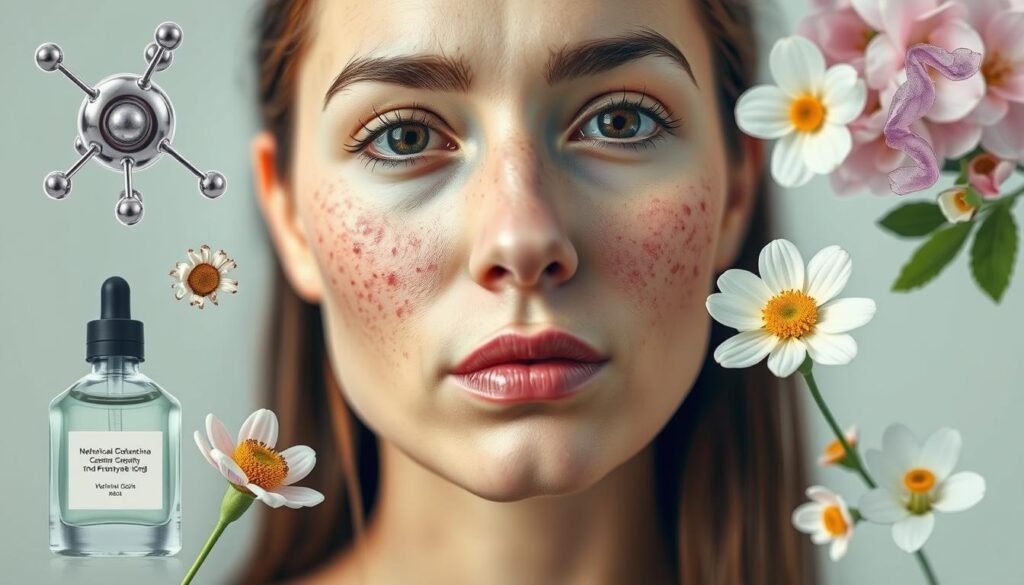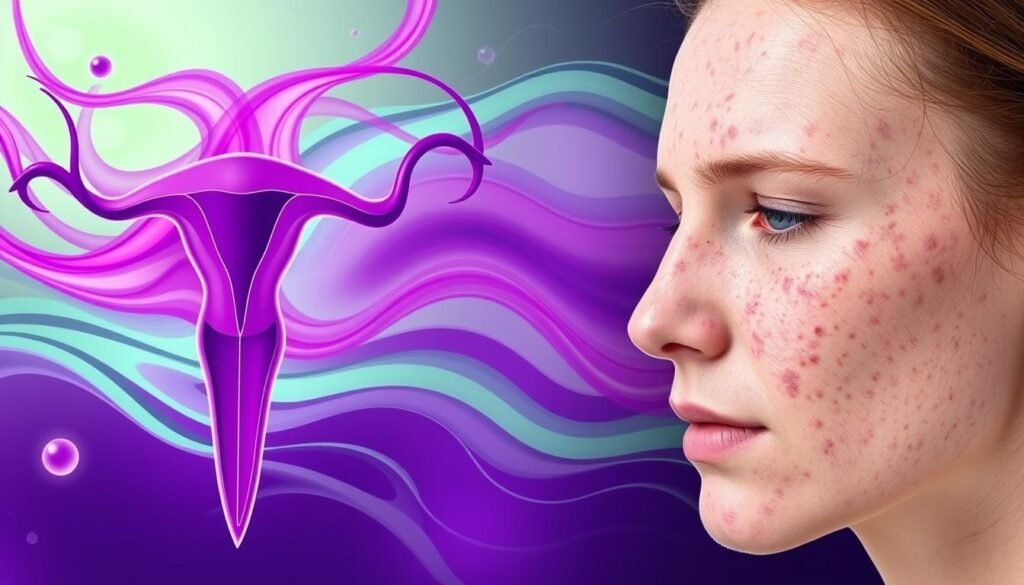Did you know that as many as 40% of patients with polycystic ovary syndrome (PCOS) experience acne? This statistic shows a big link between hormone imbalances and skin problems. PCOS isn’t just about reproductive health. It can also lead to serious skin issues like acne and hirsutism. These problems can really hurt someone’s self-esteem and overall happiness.
The connection between PCOS and skin issues is complicated. High levels of testosterone and other androgens can cause persistent acne, especially on the lower face. Understanding PCOS is important. The right treatments can greatly help with skin health and happiness.
For more details on treating PCOS-related acne, check out comprehensive treatment options.
Key Takeaways
- PCOS affects 10–34% of individuals with acne.
- Oral contraceptives can reduce inflammatory acne by 30–60%.
- 40% of women with PCOS see acne improvements with the right treatments.
- Insulin resistance is common in PCOS and plays a role in skin issues.
- Effective treatments include hormonal therapies, topical medications, and lifestyle changes.
Understanding Polycystic Ovary Syndrome (PCOS)
Polycystic Ovary Syndrome, known as PCOS, is a common hormonal disorder. It affects 8–13% of women of childbearing age. This condition shows up in many ways, which makes it tricky to identify.
A lot of women don’t know they have it. Up to 70% of those affected are in the dark about their condition.
PCOS can lead to various symptoms, like irregular periods and higher androgen levels. Women might see changes in their bodies due to polycystic ovaries. This can be seen via ultrasound. Symptoms include weight gain, acne, and feeling really down.
These issues can disrupt daily life. It shows how complex PCOS is.
To diagnose PCOS, you need to meet two out of three criteria. These include signs of too much androgen, chronic anovulation, or polycystic ovaries seen on ultrasound. PCOS is not just about reproductive health. It also raises the risk of diabetes, heart disease, and cancer of the endometrium.
Different ethnic groups may experience PCOS differently. This affects how PCOS shows up and its impact.
Dealing with PCOS usually means changing your lifestyle, taking meds, or considering fertility solutions. Although there’s no cure, these methods can help manage the symptoms. They make living with PCOS easier for women during their reproductive years.
The Role of Hormones in PCOS

Hormones are key in understanding Polycystic Ovary Syndrome (PCOS). They cause a balance to shift, leading to problems like skin issues. For example, about 90% of those with PCOS face skin problems. Acne is common, affecting roughly 67.5% of individuals.
Androgens increase oil in skin, which causes acne. High insulin levels also lead to acne and excessive hair growth. These factors show how hormones affect skin health. Moreover, imbalances in certain hormones worsen PCOS symptoms by affecting ovaries and skin.
Besides acne, hormonal imbalances cause hair loss and excessive hairiness. This is due to high testosterone. The relationship between insulin resistance, androgens, and hormones is crucial in PCOS. Regular hormone tests can help guide treatment choices. They also help improve life quality for those affected.
How PCOS Affects Skin Health

Polycystic ovary syndrome (PCOS) has a big impact on skin health because of hormonal imbalances. It affects a lot of women. The high levels of androgens can cause many skin problems like acne, too much hair (hirsutism), and oily skin. Learning about these issues can help in finding the right treatments for better skin.
Common Skin Problems Associated with PCOS
PCOS is linked with several skin conditions. Women may face:
- Acne: Persistent breakouts, often red and deep, are common on the lower face, chin, and neck. These can take a long time to heal and may leave scars.
- Hirsutism: Some get too much hair on their face, chest, and belly due to high androgen levels. This can be upsetting.
- Oily Skin: There’s often more oil on the skin, which can lead to more acne and other skin problems.
- Androgenetic Alopecia: High androgens can also cause hair thinning or a receding hairline in some women.
Impact of Hormonal Imbalance on Skin
Hormonal changes are key to the skin problems seen in PCOS. Signs like acne and too much hair come from too many androgens. This imbalance messes up normal skin processes, leading to oiliness and inflamed skin. Also, acanthosis nigricans, with its velvety patches, can appear, making skin issues from PCOS even trickier. There are ways to handle this, though, including changes in lifestyle and specific treatments. These can help balance hormones and make the skin look better.
The Hormonal Link Between PCOS and Skin Issues

Understanding the link between PCOS and skin issues means looking at two important things: androgen levels and insulin resistance. These play a big role in skin problems, especially PCOS acne.
Androgens and Their Effects on the Skin
High androgen levels mark PCOS and cause many skin issues. They make the skin oily by increasing sebum. Oily skin can clog pores, leading to acne. PCOS acne usually appears on the lower face, like the cheeks and jawline.
The amount of androgens often decides the severity of acne. This may lead to the need for hormone treatments to manage it effectively.
Insulin Resistance and Its Relation to Acne
Insulin resistance plays a big role in PCOS skin problems. High insulin can make the ovaries produce more androgens, making skin issues worse. This creates chronic inflammation, which can increase acne and other PCOS-related skin conditions. Health experts suggest managing insulin resistance to help with these skin issues. It’s crucial for balancing hormones overall.
Identifying Symptoms of PCOS-Related Acne
Knowing the signs of PCOS-related acne helps in managing it well. This acne type may not improve with usual treatments. Spotting its signs early is key.
PCOS acne often shows up on the face’s lower part, like the chin and jawline. It’s different from other acne because it’s deeper and painful. These inflamed bumps also stay longer.
- Excess body hair, called hirsutism
- Dark spots after acne heals
- Changes in skin feel or color
These signs stress the need for a thorough approach to PCOS. Working with doctors to customize treatment is crucial. This ensures care for facial acne and other PCOS symptoms for the best results.
Effective Treatment Options for PCOS Acne
Dealing with PCOS acne involves a mix of treatments. Starting with hormonal therapies can help a lot. These adjust androgen levels and improve how your skin looks.
Oral Contraceptives and Hormonal Therapies
Oral contraceptives are key in fighting PCOS acne. They lower androgens, cutting down oil and preventing pore blockage. Many see better skin in about 2 to 3 months. Sometimes, doctors suggest Spironolactone, which also cuts oil and breakouts quickly.
Topical Treatments and Their Efficacy
For lighter acne, benzoyl peroxide and salicylic acid work well. They keep the skin from getting worse. With regular use, these can make a big difference in acne control.
Lifestyle Changes and Dietary Recommendations
Changing your lifestyle also matters in managing PCOS and acne. Eating anti-inflammatory foods helps your metabolism. Losing a little weight improves insulin resistance and hormone levels. Adding exercise and reducing stress aid other treatments for clearer skin.
Talking to healthcare experts is vital for managing PCOS acne well. They guide you through PCOS complexities to specific treatments based on your needs.
Other Skin Issues Related to PCOS
PCOS affects quite a few women, with around 6–10% of them during their fertile years. It leads to various skin problems aside from acne. These include hirsutism and acanthosis nigricans. Tackling these issues is important. They greatly influence emotional health and confidence.
Hirsutism and Its Emotional Impact
Hirsutism shows up as unwanted hair on the face, chest, and abdomen in those with PCOS. It’s due to high androgen levels. The effect on one’s feelings can be deep, given beauty norms. It often results in shame and low self-worth.
Understanding Acanthosis Nigricans
Acanthosis nigricans causes dark, soft patches, usually in skin creases like the neck. It’s linked to insulin resistance, which is common in women with PCOS. While it looks like a surface problem, it might signal more serious health issues. Managing insulin can help lessen it, improving life quality.
For tips on dealing with PCOS skin problems, click here to learn more.
Exploring the Connection Between PCOS and Insulin Resistance
Insulin resistance is a common issue in many PCOS cases. The body struggles to use insulin properly, leading to high insulin levels. These levels can make obesity worse. This, in turn, might worsen insulin resistance and PCOS hormonal problems.
Insulin helps store fat in the body. Too much insulin can cause the ovaries to make more testosterone. This increase might cause dark hair to grow on the face and body. People with PCOS should keep their fasting insulin levels below 10 and glucose levels under 90.
What you eat plays a big part in handling insulin resistance. Diets rich in simple carbs and processed foods can make things worse. Stress from work or not resting enough can also make insulin resistance worse by releasing more cortisol.
Making changes to how you live can help fight insulin resistance. Eating fewer grains, similar to a paleo diet, can help bring back insulin sensitivity. Exercises like interval training and yoga also help without being too hard on the body.
Staying away from certain foods like bread and milk can help. Women with PCOS face a higher chance of other health issues because of insulin resistance. This condition strongly indicates they might get metabolic syndrome and type 2 diabetes later.
About 50-60% of women with PCOS have insulin resistance. This can lead to diabetes and other problems. If your family has a history of insulin resistance and obesity, it can make matters more complex. Knowing how PCOS, obesity, and insulin resistance link together is vital. It helps in finding the right ways to manage and improve health.
| Factors Affecting Insulin Resistance | Impact on PCOS | Recommended Treatment Options |
|---|---|---|
| Diet high in simple carbs | Exacerbates insulin resistance | Low-grain diet |
| Chronic stress | Leads to cortisol release | Stress management techniques (e.g., yoga) |
| Obesity | Increases hormonal imbalances | Weight loss interventions |
| Physical inactivity | Worsens insulin resistance | Moderate exercise (e.g., interval training) |
It’s key for people with PCOS to deal with insulin resistance. This will help them improve their metabolic health and lower the risk of more serious problems later on.
Conclusion
Polycystic Ovary Syndrome (PCOS) affects women’s health around the world. Many deal with skin problems like acne, hirsutism, and acanthosis nigricans. The high androgen levels in PCOS are often to blame for these issues. They can lead to more sebum, which makes acne worse. Knowing how these factors connect helps in tackling PCOS’s physical and emotional sides.
Dealing with PCOS requires a plan that fits the person’s needs. There are hormonal therapies, skin treatments, and changes in lifestyle that can help a lot. Things like eating well and staying hydrated not only improve skin but also balance hormones. This gives people a sense of control over their health.
If you have PCOS symptoms, it’s important to get advice that’s right for you. Tackling hormonal and skin issues early can make a big difference. It helps improve your life quality by a lot.